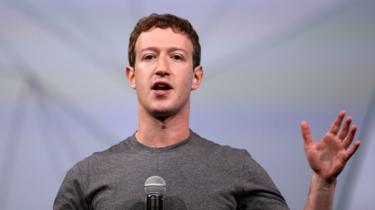Facebook to use surveys to boost ‘trustworthy’ 2news
Facebook has announced it will prioritise news sources deemed to be more trustworthy on its News Feed.The firm said the social network community would determine which outlets are reliable via the use of user surveys.

Mark ZuckerbergImage copyrightGETTY IMAGES
Image caption
Facebook said it will now tell users which news outlets are reliable
Founder and chief executive Mark Zuckerberg said news content would soon make up around 4% of what appeared in people's News Feeds - down from 5% before.
The move is the latest attempt by the company to quell the spread of so-called fake news and propaganda on the network.
Mark Zuckerberg vows to 'fix' Facebook
As part of that continuing battle, Twitter also announced on Friday that it had notified 677,775 US-based users who had retweeted, liked or followed Russian bot accounts on the network in the run up to the 2016 US presidential election.
The change is an attempt to shift the key judgements over bias and accuracy away from Facebook's employees, and onto its user base.
"We could try to make that decision ourselves, but that's not something we're comfortable with," Mr Zuckerberg said.
"We considered asking outside experts, which would take the decision out of our hands but would likely not solve the objectivity problem. Or we could ask you - the community - and have your feedback determine the ranking."
Users will be asked, as they sometimes are about advertising, whether they recognise a news brand and if they trust it.
Facebook's theory - yet to be tested on a large scale - is that while there are many partisan outlets that have readers that trust them, there is a smaller subset of media companies that a majority people find "broadly trustworthy", whatever their particular leanings.
There's too much sensationalism, misinformation and polarisation in the world today," wrote Mr Zuckerberg, who recently announced that his challenge this year was to essentially "fix" Facebook.
"Social media enables people to spread information faster than ever before, and if we don't specifically tackle these problems, then we end up amplifying them."
Winners and losers
The news ranking system will first be tested on US-based users only, and the results of the survey will not be made public.
"This is one of many signals that go into News Feed ranking," a Facebook spokesman told the BBC.
"We do not plan to release individual publishers' trust scores because they represent an incomplete picture of how each story's position in each person's feed is determined."
As with any algorithm change, be it Facebook or any other major web service, there will be some that benefit and others that will struggle.
Facebook - the secret election weapon
Among the winners will likely be traditional media organisations with long histories or a strong broadcast presence, such as the New York Times or BBC.
Mor about visit links source.http://www.bbc.com/news/technology-42755832
(2) Hopeful contenders for everlasting fame must run the gauntlet of numerous challenges, including the jealousy of rivals and possible extinction of their own civilisation and language. How do you remain remembered for generations?

I’m in the secluded western corner of London’s Highgate cemetery, looking at a large marble tomb. It’s long and box-like, with a life-sized sculpture of a dog slumped at its foot. The stone is mottled and tendrils of strangling ivy are creeping up its base. An inscription reads “Erected to the memory of Thomas Sayers”.
Our guide asks the group if anyone has heard of this man. We shake our heads blankly.
At the time of his death the situation was very different. It was the winter of 1865 and Sayers, who began his career as an illiterate bricklayer, had risen to become the most celebrated sportsman of the Victorian age.
This was England’s first bare-knuckle fighting champion. His final match, which he fought largely one-handed in a Hampshire field, was watched by thousands. Special trains were chartered to transport the spectators, who included fellow Victorian superstars like the novelists Charles Dickens and William Thackeray. Even the Prime Minister of the day, Lord Palmerston attended; Parliament shortened its hours especially and Queen Victoria asked to be informed of the result.
When he died a few years later, the funeral procession stretched for two miles and included some 100,000 people. The cemetery descended into chaos as people climbed trees and trampled tombstones, hoping for a better view.
One hundred and fifty two years on, his reputation has turned to dust. He’s still well known to history buffs and boxing obsessives – but to the rest of us, he needs an introduction.
The steady march of time has left many other similar casualties in its wake – people who have risen to dizzying heights of fame only to be largely forgotten. There’s the Greek poet Sappho, whose steamy verses titillated audiences for much of antiquity. The verses were so enchanting, one Athenian lawmaker said he felt that once he’d heard them, he could die.
Mor about visit links source. http://www.bbc.com/future/story/20171220-how-to-be-remembered-in-1000-years